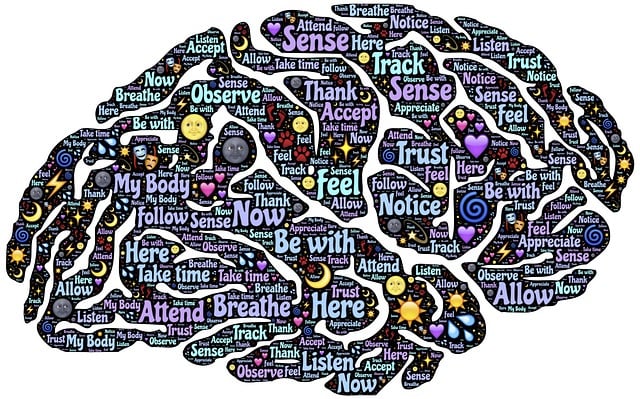Mental health advocacy in Longmont, Colorado, is a multi-faceted approach to improving community well-being. Through educational campaigns, open conversations, and accessible platforms like the Mental Wellness Podcast Series, residents are encouraged to discuss mental health openly. Local therapy services, such as Longmont Couples Counseling Therapy, provide specialized support for couples facing mental health challenges, combining evidence-based practices with risk management planning. Collaboration between local businesses, healthcare providers, schools, and advocacy groups amplifies impact, fostering self-care routines and emotional regulation techniques. Strategic partnerships aim to create tailored programs, reduce stigma, and improve access to counseling services, ultimately prioritizing mental health within the community. Evaluating program effectiveness through data-driven measures ensures advocacy efforts make a tangible difference in residents' lives.
Mental health advocacy is a powerful tool for fostering well-being in our communities. This article explores the multifaceted approach to promoting mental wellness, with a focus on the role of professional therapy, like Longmont Couples Counseling Therapy. We delve into effective strategies and collaborative network building, highlighting successful programs while offering insights on evaluation metrics. By understanding these initiatives, we can create supportive environments that prioritize mental health and resilience.
- Understanding Mental Health Advocacy: Why It Matters in Our Communities
- The Role of Longmont Couples Counseling Therapy in Promoting Mental Wellness
- Strategies for Effective Mental Health Advocacy Initiatives
- Collaborating with Local Organizations: Building a Supportive Network
- Measuring Impact: Evaluating the Success of Mental Health Advocacy Programs
Understanding Mental Health Advocacy: Why It Matters in Our Communities

Mental health advocacy is a powerful tool for fostering understanding and breaking down stigmas within our communities. It involves raising awareness about mental health issues, educating individuals on available resources, and promoting open conversations. This initiative is crucial in ensuring that people struggling with their mental well-being receive the support they need. By advocating for mental health, we create an environment where everyone feels comfortable seeking help, whether it’s through Longmont Couples Counseling Therapy or individual counseling services.
This advocacy goes beyond mere awareness; it involves encouraging community members to learn communication strategies and social skills training to better support those around them. The impact of these efforts can be seen in the production of Mental Wellness Podcast Series, which provide accessible platforms for sharing stories and expertise. Through such initiatives, our communities become more equipped to handle mental health challenges, ensuring that everyone has access to resources that promote overall mental wellness.
The Role of Longmont Couples Counseling Therapy in Promoting Mental Wellness

In the heart of Longmont, Colorado, Couples Counseling Therapy stands as a beacon of hope and healing for individuals navigating through mental health challenges alongside their partners. This specialized form of therapy plays a pivotal role in promoting mental wellness by addressing the unique dynamics and communication issues that often arise in intimate relationships. By fostering open dialogue and providing a safe space, Longmont Couples Counseling Therapy facilitates emotional healing processes, empowering couples to better understand and support each other’s mental health journeys.
The therapy sessions are tailored to meet the specific needs of each couple, incorporating evidence-based practices and strategies for risk management planning for mental health professionals. Through this collaborative approach, therapists help partners develop coping mechanisms, enhance communication skills, and cultivate a deeper sense of empathy and connection. By integrating mental wellness as a core aspect of their practice, Longmont Couples Counseling Therapy not only strengthens relationships but also contributes to the overall well-being of the community.
Strategies for Effective Mental Health Advocacy Initiatives

Mental health advocacy initiatives require a multi-faceted approach to be truly effective. First and foremost, Longmont Couples Counseling Therapy facilities should prioritize education and awareness campaigns that destigmatize mental health issues. This can involve community workshops, school programs, and media outreach to foster open conversations about emotional well-being. Engaging local businesses, healthcare providers, and educational institutions in these efforts ensures a collaborative approach that amplifies impact.
Additionally, initiatives should focus on inner strength development through practices like mindfulness, meditation, and therapy sessions tailored to individual needs. Encouraging self-care routines and teaching effective emotional regulation techniques empowers individuals to manage stress and maintain mental balance. By combining these strategies with support groups and advocacy events, communities can cultivate a culture that prioritizes mental health and seeks help when needed, ultimately leading to improved quality of life for all residents, including those served by Longmont Couples Counseling Therapy services.
Collaborating with Local Organizations: Building a Supportive Network

Collaborating with local organizations is a powerful strategy to foster a supportive network for mental health advocacy initiatives, especially in communities like Longmont where couples counseling therapy services are accessible. By joining forces, community members, therapists, and advocacy groups can amplify their impact and create a web of support for individuals facing mental health challenges. This collaborative approach leverages the expertise and resources of diverse organizations to develop targeted programs and policies that address specific mental health needs within the local population.
For instance, partnerships between mental health professionals, community centers, schools, and local government bodies can lead to innovative initiatives like depression prevention programs, enhanced risk assessment for mental health professionals, and improved access to counseling services. Such collaborations ensure that advocacy efforts are well-rounded, informed by data (Mental Health Policy Analysis and Advocacy), and responsive to the unique needs of the Longmont community. Through collective action, these organizations can break down barriers to care, reduce stigma, and ultimately promote better mental health outcomes for all residents.
Measuring Impact: Evaluating the Success of Mental Health Advocacy Programs

Evaluating the success of mental health advocacy programs is a critical step in understanding their impact and effectiveness. Measuring impact goes beyond simple satisfaction surveys; it involves assessing tangible changes in participants’ lives. For instance, tracking improvements in coping skills development, positive thinking patterns, and social skills training can provide concrete evidence of program success. Longmont Couples Counseling Therapy, for example, has seen significant progress by employing these metrics, demonstrating the power of structured interventions in enhancing mental well-being.
By quantifying changes pre and post-program participation, advocates gain valuable insights into what strategies are most beneficial. This data-driven approach allows them to refine programs, tailor services to diverse needs, and ultimately, improve overall community mental health. It ensures that resources are allocated efficiently and that advocacy initiatives are making a lasting difference in the lives they aim to support.
Mental health advocacy initiatives, such as those promoted by Longmont Couples Counseling Therapy, are vital in fostering supportive communities. By implementing effective strategies and collaborating with local organizations, we can significantly enhance mental wellness. Measuring the impact of these programs is crucial to ensure their success and adapt them to better serve our diverse populations. Through collective efforts, we can create a more inclusive and understanding society where everyone has access to quality mental health support.














